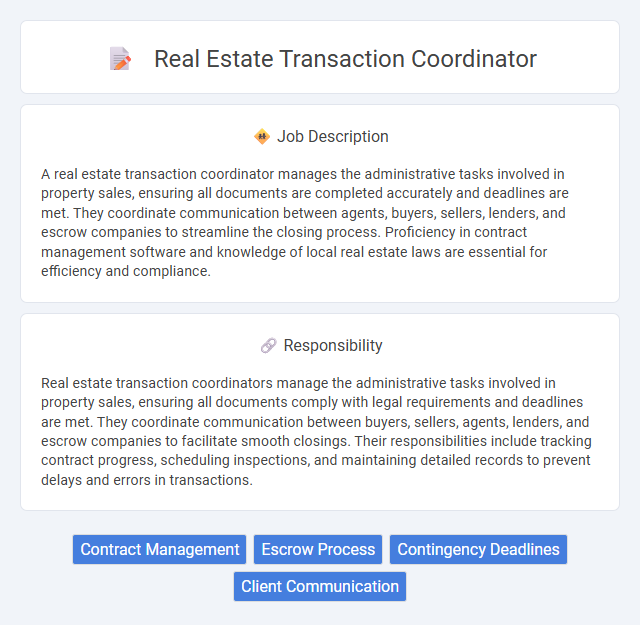
A real estate transaction coordinator manages the administrative tasks involved in property sales, ensuring all documents are completed accurately and deadlines are met. They coordinate communication between agents, buyers, sellers, lenders, and escrow companies to streamline the closing process. Proficiency in contract management software and knowledge of local real estate laws are essential for efficiency and compliance.
People with strong organizational skills and attention to detail are likely suitable for a real estate transaction coordinator job, as managing contracts and deadlines is essential. Those who enjoy multitasking and working in a fast-paced environment might find this role fitting, while individuals preferring solitary or less time-sensitive tasks may struggle. A high level of communication skills and the ability to handle multiple stakeholders simultaneously may increase the probability of success in this position.
Qualification
A real estate transaction coordinator typically requires strong organizational skills, attention to detail, and knowledge of real estate contracts and regulations. Proficiency in transaction management software such as Dotloop, DocuSign, or Skyslope is essential to ensure smooth processing and compliance. Effective communication and multitasking abilities help in coordinating between agents, clients, escrow officers, and lenders to facilitate successful real estate closings.
Responsibility
Real estate transaction coordinators manage the administrative tasks involved in property sales, ensuring all documents comply with legal requirements and deadlines are met. They coordinate communication between buyers, sellers, agents, lenders, and escrow companies to facilitate smooth closings. Their responsibilities include tracking contract progress, scheduling inspections, and maintaining detailed records to prevent delays and errors in transactions.
Benefit
Real estate transaction coordinators likely improve workflow efficiency by managing deadlines, documentation, and communication between parties involved in property deals. This role probably reduces the risk of errors and delays, increasing client satisfaction and smooth closings. Employers and agents might benefit from the time saved, allowing them to focus on sales and client relationships.
Challenge
Handling multiple deadlines and coordinating between buyers, sellers, agents, and lenders often presents significant challenges for real estate transaction coordinators. The probability of encountering last-minute document requests or compliance issues may require quick problem-solving and excellent organizational skills. Maintaining clear communication while managing a high volume of transactions could also increase the likelihood of stress and errors.
Career Advancement
A real estate transaction coordinator streamlines contract processes, ensuring accuracy and timely communication between all parties involved. Gaining expertise in document management and compliance enhances eligibility for senior coordinator or office manager roles. Mastery in real estate software and negotiation supports career growth into brokerage management or licensed agent positions.
Key Terms
Contract Management
A Real Estate Transaction Coordinator specializes in contract management by meticulously organizing and reviewing purchase agreements, escrow documents, and contingency timelines to ensure compliance and smooth closings. They act as a liaison between agents, clients, lenders, and title companies to monitor deadlines and manage document submissions efficiently. Their expertise reduces legal risks and accelerates transaction cycles through precise contract tracking and communication.
Escrow Process
A real estate transaction coordinator manages the escrow process to ensure smooth and timely completion of property sales. They oversee documentation, communicate with escrow officers, lenders, and agents to track contingencies, deposits, and deadlines. Expert coordination minimizes risks and ensures compliance with all contractual and legal requirements during escrow.
Contingency Deadlines
A real estate transaction coordinator plays a crucial role in managing contingency deadlines to ensure smooth closing processes. They meticulously track and monitor deadlines related to inspections, appraisals, and financing contingencies, minimizing risks of contract breaches. Effective coordination helps agents and clients meet all required dates, preventing delays and potential legal issues in the transaction.
Client Communication
A Real Estate Transaction Coordinator manages client communication by ensuring timely updates and clear information exchange throughout the transaction process. They coordinate between buyers, sellers, agents, and lenders to resolve issues promptly and maintain a seamless flow of documentation. Effective client communication enhances customer satisfaction and supports successful real estate closings.
 kuljobs.com
kuljobs.com